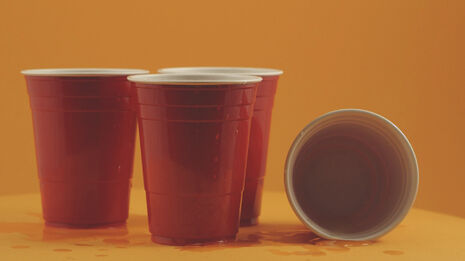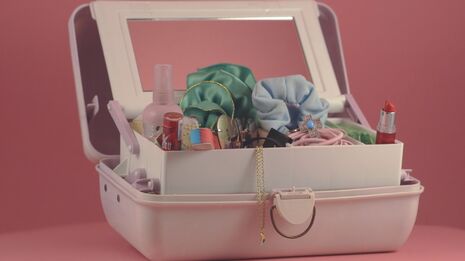Beyond Clueless: a poisoned love letter to the teen movie
Ciara Nugent explores the parallel universe of the teen movie and talks to Charlie Lyne about his new documentary

Music swells, lips meet, the touch down is scored, the geek stands up for himself, the evil bitch is exposed as an evil bitch and the heady thrill of the teen movie envelops you in its warm, uncomplicated glow.
This is a place we know well; the parallel universe of the American high school has been there since we can remember, staring invitingly back at us from screens as we trudged to school in grey uniforms and drizzly weather and went to house parties with an upsetting lack of red plastic cups. In Beyond Clueless, which previews at the Arts Picturehouse this Tuesday 13th January, Charlie Lyne delves into this universe, using footage from over 300 teen movies.
Why were we so intoxicated by this world? Is there something inherently more romantic about the realm of proms and quarterbacks than the British education system? Lyne’s not so sure; “The world of the American teen movie feels romantic and aspirational precisely because we see it so often, which in turn means that demand for American teen movies rises, and so the cycle continues.” This awareness of the hypnotic mechanics of the industry make Beyond Clueless a fascinating study in genre. As we move through its five parts, each reflecting a stage of the rigid generic structure, and meet the repetitive cast of characters that make up each film, the formulaic conventions become overwhelmingly evident. Yet though he exposes this formula, Lyne does not try to strip it of its power.
What makes the film enthralling is its willingness to not just study but participate in teen movie universe. Knowing that his British-accented voiceover would fracture the insularity of this parallel world – “it gave the film the air of an outsider's view, which was totally wrong for what we were trying to achieve”– he enlists the American drawl of Fairuza Balk, star of cult teen films like The Craft, to anchor us firmly within it. Rousing montages punctuate each section with the most emblematic of teen movie moments: strutting through a busy hallway, getting drunk at a house party, taking off your clothes, freaking out, prom, graduation, masturbation. This natural rise and fall rhythm is complemented by Summer Camp’s mesmerising soundtrack, which I’ve been listening to on loop for the past three days. Its slow-builds, crashing choruses and explosive climaxes expose these films for what they are: orgasmic celebrations of the emotional power of adolescence.

This is the real appeal of teen movies. They allow us to relive the purity of emotional extremes that are progressively dulled as we leave the first flushes of youth. They are composed of ups and downs. Once the initial plot point begins, be it starting a new school, meeting the boy of your dreams or taking on some kind of sporting challenge (normally all three), there’s little of the boring in-between stuff. Beyond Clueless joyously displays the peaks: Starla slapping Genevieve in Slap Her She’s French, Scotty finally meeting his hot German pen-pal in Eurotrip, Jany’s transformation from geek to prom queen in She’s All That; and revels in the impossibly exaggerated wish fulfillment that accompanies them. I think we’d all like to believe that if we had a particularly good week we’d inspire our classmates to rap about how great we are. But the troughs of teendom are just as powerful and Lyne embraces these too, plunging us into a dark stream of self-harm, drugs, guns and violence, with swirling camera angles and a dizzying score that captures the intensity of what it’s like to lose control when you’re young.
However punchy these films are, they’re far from perfect. “For every progressive step forward in the teen genre, there tend to be two massive steps back,” notes Lyne. Incredibly problematic representational practices are ten for a penny and Beyond Clueless makes this hard to ignore as over 300 films worth of overly sexualised young girls, gay jokes and exclusively white faces are paraded before your eyes. Lyne specifies that his intention “was never to explicitly condemn the teen genre, but to reflect its tendencies as best I could and let people draw their own conclusions”. The portrayal of The Girl Next Door, the story of a porn star who moves in next door to a high school boy, is particularly revelatory in this respect. The narrator objectively sums up the simplistic lesson preached by the film: "The chasm between them is simply too great. And it’s clear who should be the one to change. And so Danielle abandons her career and follows Matthew into a world of prim respectability" and she thanks him. The lack of feminist criticism forms a very effective kind of silent commentary as it reminds us of the uncritical way in which we consumed these films as kids.
For Lyne, “the pleasure is still there, and it's just as potent as it was a decade ago, but now it's tinged with an awareness of what these films taught me when I was at my most impressionable — some of it good and some of it incredibly damaging.” His film does allow us to revisit the irresistible power of the teen movie, but it also encourages us to reassess how this parallel world has shaped our own; “Beyond Clueless is undoubtedly a love letter”, he says, “but it's a poisoned one”.
A preview screening of Beyond Clueless, followed by a Q&A with Lyne, will take place this Tuesday, 13th January at the Cambridge Arts Picturehouse, before opening nationwide on 23rd January.
 News / Eight Cambridge researchers awarded €17m in ERC research grants27 December 2025
News / Eight Cambridge researchers awarded €17m in ERC research grants27 December 2025 News / News in Brief: carols, card games, and canine calamities28 December 2025
News / News in Brief: carols, card games, and canine calamities28 December 2025 Interviews / Meet Juan Michel, Cambridge’s multilingual musician29 December 2025
Interviews / Meet Juan Michel, Cambridge’s multilingual musician29 December 2025 Sport / Hard work, heartbreak and hope: international gymnast Maddie Marshall’s journey 29 December 2025
Sport / Hard work, heartbreak and hope: international gymnast Maddie Marshall’s journey 29 December 2025 News / Caius mourns its tree-mendous loss23 December 2025
News / Caius mourns its tree-mendous loss23 December 2025







